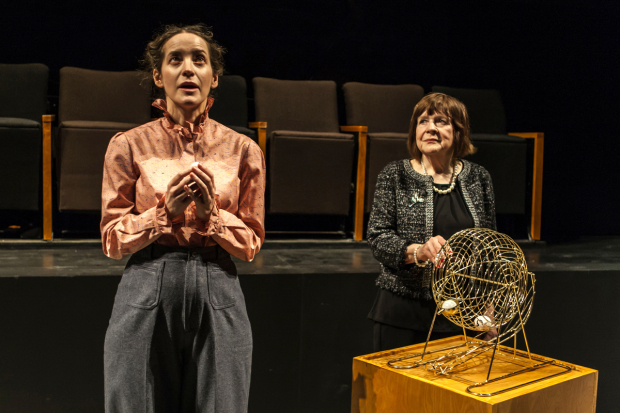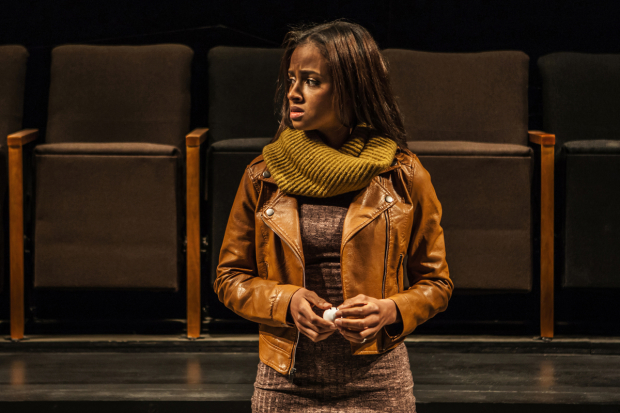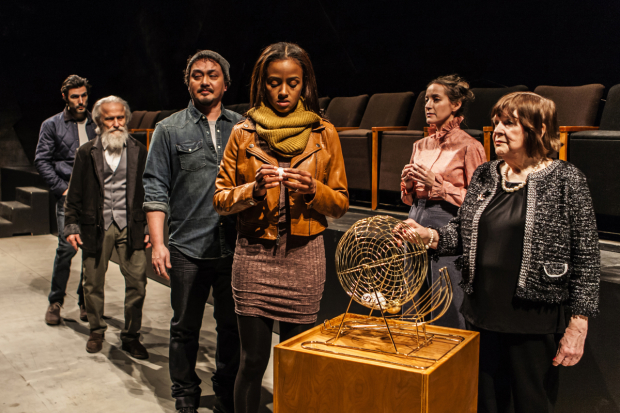
(© Monique Carboni)
Can actors play ideas? They do in Branden Jacobs-Jenkins' Everybody, now making its world premiere with Signature Theatre. Specifically, the actors in this nine-person cast are called to portray roles like "Friendship," "Understanding," and "All the Sh*tty Things" — put that on your résumé. It is just one of the many admirable experiments in a new play that is at turns ambitious, witty, and a bit dull.
I say "experiments," but the concept behind Everybody is actually quite old. It is based on the anonymous 15th-century morality play The Summoning of Everyman, which places man in dialogue with personified concepts in order to convince viewers to embrace a godly life of good deeds (a concept that naturally takes the form of a sickly maiden). As mentioned, the actors in this adaptation also play abstractions, but with the exception of God (Jocelyn Bioh) and Death (an oddly convincing Marylouise Burke), they rotate parts every night based on a random drawing. While I note the actors in the roles as I saw them, they are unlikely to repeat this exact casting, which is a thrilling commitment to the power of live performance that also allows for a variety of actors to portray the central role. It is the most innovative aspect of this surprisingly tepid treatment of the story.

(© Monique Carboni)
Death calls Everybody (Brooke Bloom) to her final resting place, but Everybody protests that she is unprepared. She asks if she could be given time to find a companion to join her on this frightening journey. "Sure," Death enthusiastically replies, "if any were brave enough to come with you." But after initially promising to go "to hell and back" for her, Friendship (David Patrick Kelly) flakes, as do Kinship (Lakisha Michelle May) and Cousinship (Michael Braun). Stuff (Louis Cancelmi) is far more comforting, but as Kaufman and Hart taught us, you can't take it with you. Love (Chris Perfetti) is willing to go along for the ride, but Everybody has to sacrifice some dignity first. This all works up to an undeniable truth: Everybody dies alone.
As he did with An Octoroon, Jacobs-Jenkins takes an old play largely forgotten by the modern repertory and adapts it for contemporary eyes and ears. Despite its metatheatricality and prodigious sass, Everybody is not so much a deconstruction as it is a transposition, an attempt to plumb the timeless lessons of this didactic work of Catholic drama and convey them to an audience in 2017.
The change of title from Everyman to the more inclusionary (some might say "politically correct") Everybody hints at the manner in which Jacobs-Jenkins retrofits the play for modern consumption. He removes the parts about confession and penance, but adds references to capitalism and social media, explicitly showing how the themes of the play relate to our lives. His approach is a little more artful in the blackouts between these scenes: Sitting in complete darkness, we hear the sound of friends chatting about dreams, a conversation that quickly devolves into accusations of racism and myopia. The speakers seem to purposefully seek out an excuse to be offended and then destroy the person who originated that offense, almost as a form of entertainment. In the age of Facebook flame wars, these examples of wrath feel uncomfortably on point.
The actors convincingly embody their various roles with human specificity: Cancelmi's Stuff is simultaneously seductive and cold. Perfetti plays Love like a misunderstood and inexplicably attractive boyfriend. Lilyana Tiare Cornell rounds out the cast as an adorably insistent Time. These solid performances still don't fully rescue the play from its didactic origins. Dress a medieval morality play up in 21st-century slang and it comes off sounding like a skit for incoming college freshman performed by the resident assistants of purgatory.
The one time we really feel like we are encountering the unexplained comes during an early monologue by God about what a disappointment we humans are: Bioh moves deliberately yet awkwardly, as if she were not fully in control of her body. Her eyes point off in different directions, suggesting blindness — an omniscient deity doesn't really need frail mortal senses to see where she is going. It is a bewitching performance.

(© Monique Carboni)
Nothing in director Lila Neugebauer's high-design production quite rises to the tone set in those austere first 10 minutes, but it is often very impressive. Laura Jellinek's set is an imposing rock wall hiding some big surprises. Raja Feather Kelly choreographs a ballet that features giant puppets and nightclub lighting by Matt Frey. Taken with Brandon Wolcott's pulsating original music, it all comes to resemble the Chromolume from Sunday in the Park with George. It is an awfully extravagant departure from Everyman, a play designed to be produced by any poor town parish.
Like the original, Everybody has a closing statement that bangs us over the head with a moral, in case the preceding 100 minutes of heavy-handed parable wasn't enough to encourage us to form one on our own. Jacob-Jenkins cannot be accused of deviating from the morality play form to push his own agenda, but we really wish he would. It would make for a far livelier and more challenging night at the theater.









